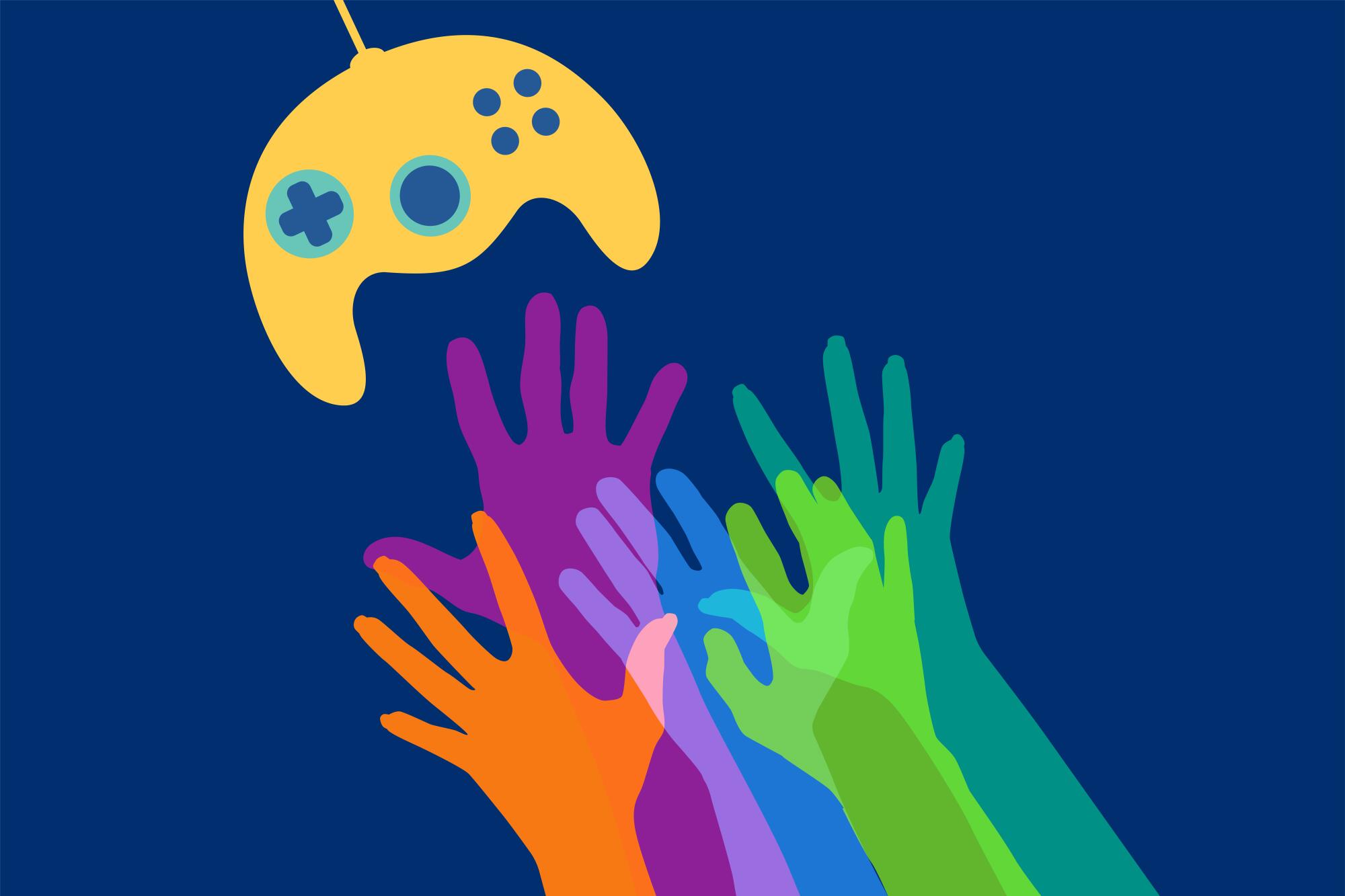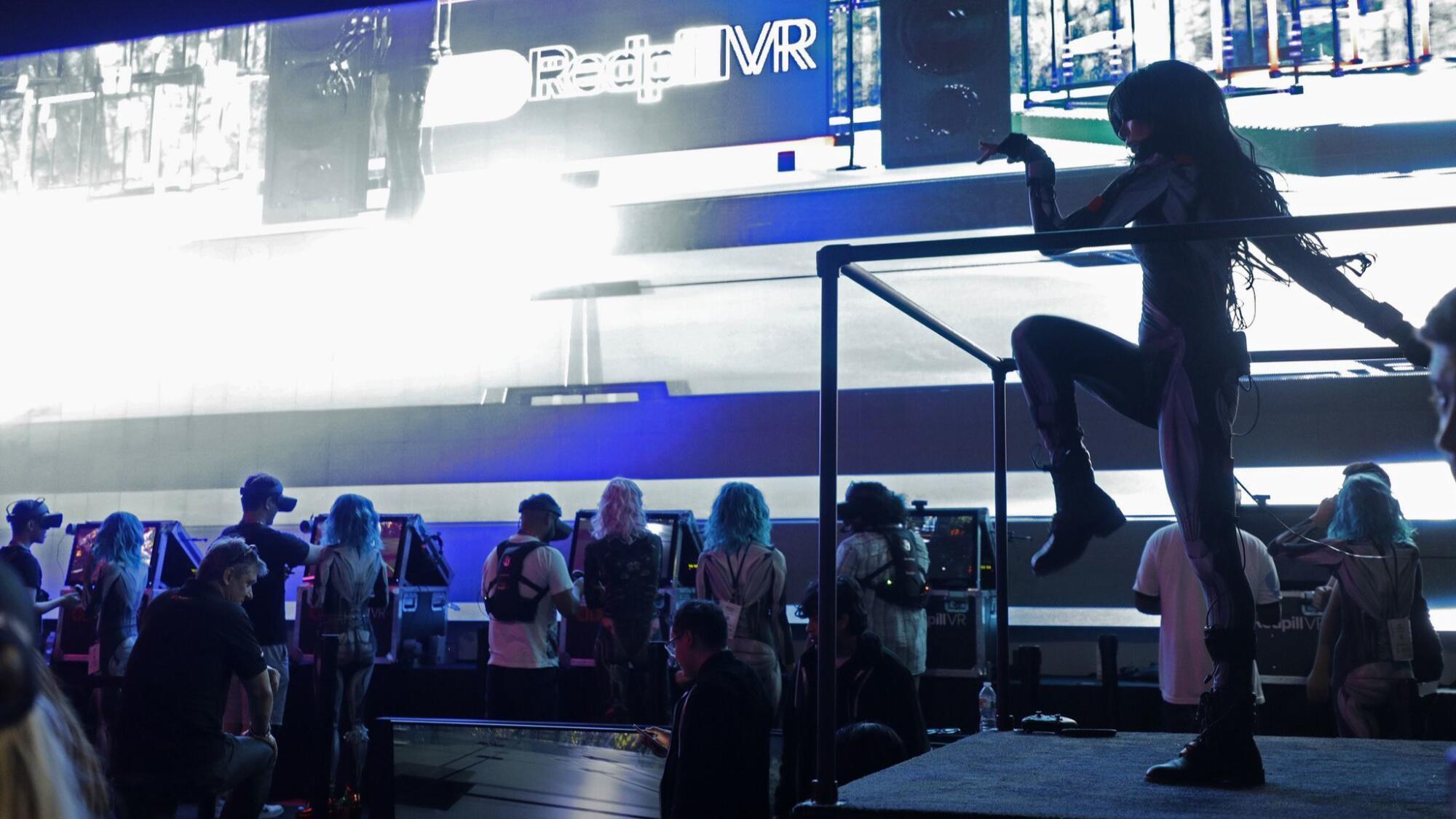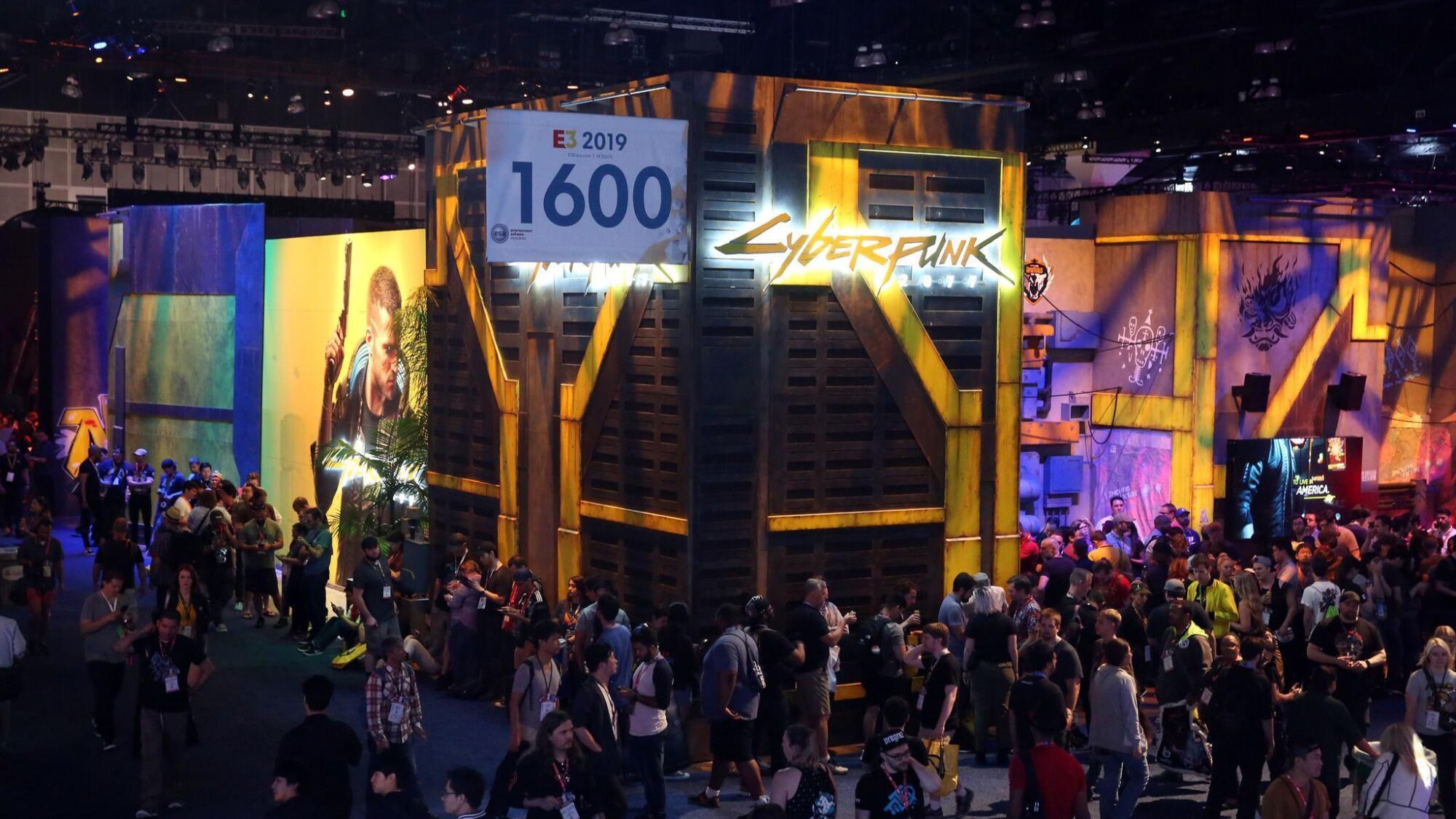
Allegations of sexual, emotional and professional abuse reveal the game industry’s struggles to mature. Ubisoft resignations are only part of the fallout.
- Share via
American culture — who it represents, what it says — is undergoing a rethink, a long overdue course-correction in which social movements against racism and sexual harassment and abuse have galvanized participants to demand change. Accusations of toxic behavior unfurl almost daily in social media threads against a host of actors, comedians, film executives and media personnel.
And in recent weeks the entirety of the game industry has been put on blast.
Chris Avellone, a high-profile game writer and designer, was accused of sexual misconduct by several women on Twitter, leading numerous companies to distance themselves from the storyteller known for his work on “Star Wars” titles and other role-playing games. Techland, the developer of “Dying Light 2,” issued a statement that said, “together with Chris Avellone, we’ve decided to end our cooperation,” citing “no tolerance” for “matters of sexual harassment.” Electronic Arts, distributor of “Star Wars Jedi: Fallen Order,” said in a statement, “EA has no plans to work with Chris Avellone moving forward.”
Then late last month, several high-ranking staffers at gaming giant Ubisoft (“Assassin’s Creed”) were placed on leave after online allegations sparked a still-ongoing investigation of a range of sexual improprieties, many of which were detailed by Kotaku. After company CEO Yves Guillemot outlined several steps on July 2 for making “fundamental change” to Ubisoft’s workplace culture, an editorial vice president, Maxime Béland, resigned. Béland and Tommy Francois, vice president of editorial and creative services, who is on disciplinary leave, were part of an all-white male editorial team, which the company has now pledged to “revise.”
Update: More executive resignations at Ubisoft after allegations of harassment, misconduct
In 2020, no aspect of gaming has been spared. Allegations of a range of aggressions that include sexual, emotional and professional abuse began on a large scale last fall, when independent developers, a prominent composer and an executive in the virtual reality space were accused of sexual harassment or abuse. Dozens of streamers on the gaming site Twitch have been singled out, as detailed by the New York Times, as have executives in the esports talent management space. The old-fashioned tabletop arena hasn’t been exempt either. Cards Against Humanity was subject to a Polygon investigation into its toxic workplace, resulting in its cofounder stepping down.
Taken as a whole, the past month in gaming has pulled the curtain back on a business and a media subculture that has struggled to mature beyond its rebellious, boyish and boorish stereotypes. If there’s a difference between gaming and other industry reckonings that occurred in the wake of the #MeToo and TimesUp movements, it’s that allegations in the interactive entertainment industry significantly extend beyond obvious abuses of power and instead paint a picture of a broken culture, where anyone who is not a white male weaned on games has to engage in an uphill, exhausting battle to not be seen as an outsider.

With today’s multimillion-dollar executive salaries and major companies such as Microsoft, Sony and Nintendo dominating the corporate landscape, gaming may appear a long way removed from its less-formal 1970s beginnings. Back then, tales of Atari staffers taking office meetings in hot tubs were decades away from eliciting cringes and on their way at the time to becoming the stuff of early, romanticized legend. But gaming has never quite shed its nonconformist attitude, which could be lauded if one is discussing adventurous, challenging art but can also lead to a worrisome, stressful work culture that, if not outright encouraging systemic issues of sexism, certainly wasn’t confronting them.
“It’s part of this history of being an outsider, of something that people don’t take seriously,” says Naomi Clark, a game designer and scholar with the NYU Game Center. “A lot of the game industry here in this country has come out of people’s garages and bedrooms and is not even being taken as seriously as other types of software development. It’s strange, it’s scrappy. All of that outsider-ness fostered this culture: ‘We don’t have to play the rules. We’re not a regular office. The bosses’ door is always open. We don’t wear suits. It’s informal. It’s not hierarchical.’
“It’s a lie,” Clark says.
Evidence? Hundreds of extremely personal, first-person accounts have been posted online over the last month.
If one defines the game industry broadly, then in recent weeks there have been well over 100 accusations of, at worst, rape and, at best, inappropriate workplace behavior. There is no easy Twitter hashtag for those aiming to get caught up, but some professionals such as celebrated developer/writer Meg Jayanth, whose game “80 Days” reimagined a Jules Verne classic from the point of view of those often left out of popular narratives, has been collecting and amplifying industry stories (Jayanth declined an interview and directed The Times to her public social media comments).
What seems apparent is that those in the games industry are speaking up not just to rid the industry of its toxic personnel, but to demand a reimagining of the game space. Stories that have been shared are vast. There are accusations of sexual assault and presentations of overly graphic, sexually aggressive text messages to mentees, as well as tales of serial adultery with young women new to the business. There are harrowing stories of staffers continuing to work alongside their abusers, and studios large and small appear equally at risk.
There are also accounts of pay disparities and of having to network in a closely knit community where jobs come via word-of-mouth at alcohol-fueled industry mixers. Those who tried to speak up at their workplace sometimes tell of vague, non-compete clauses among game studios, essentially forcing someone who was made to feel uncomfortable to either stay put or leave the industry entirely. And yet there are also stories of how once white male-heavy game studios were remade into more inclusive spaces, signaling that there is a better way.
Years of neglect
While the movement can be attributed in part to the cultural reassesment occurring in 2020, which is happening on such a large and pervasive scale that even Disney committed to re-theming one of its most popular rides, it’s also emblematic of a relatively liberal-minded industry that for years failed to address cultural concerns.
Back in 2014 when the lack of diversity in game content and game studios started to garner national attention, female game developers and journalists were attacked as part of a harassment campaign that was embraced by the alt-right and became known as “gamergate.” Gaming studios at the time were largely quiet, re-enforcing a public perception that this is a field filled with men who create content for boys.
“I think for a long time it was thought of as this last bastion of masculinity, and it was thought of this weird niche thing for nerds and geeks,” says Anita Sarkeesian, founder of Feminist Frequency, a not-for-profit organization that analyzes media and games that rose to prominence with an online series entitled “Tropes Vs. Women in Games.”
Ex ‘Westworld’ writer Halley Gross joins Neil Druckmann to create the unexpectedly timely story in “The Last of Us Part II” set in a virus-ravaged world
“The mainstream didn’t pay attention to games for a long time,” says Sarkeesian, who is in the midst of launching the Games and Online Harassment Hotline, a free text-based service designed to provide emotional support or referrals to those in need. “The culture of games didn’t allow for dissent outside of that white male-dominated culture. So when you did have people coming in and challenging those attitudes, those norms and the status quo, they were viciously attacked. So I think it took a long time for games to get to a point where people could come forward.”
Thus, what’s occurring now is a full-scale examination of how gaming got to this point, and where it can go in the future. The public revelations in recent weeks are not just about calling out those who have committed sexual assault, but are also intent on bringing attention to an industry steeped in systemic misogyny, an industry that has been slow to adapt.
“We’ve built this culture where there’s no accountability in the moment, because women are often vilified or not believed if they report it and are afraid to do it,” says Shanon M. Ingles, a games writer and narrative designer.
“So now,” Ingles says, “it becomes, ‘You got away with something for 20 years. You’re going to be beheaded in front of everyone.’”
‘Do you have a boyfriend?’
Imagine yourself new to the game industry, invited to a networking event for your local community. One comment taken on its own doesn’t appear horrific. “Nice dress. Want a drink?”
But you’re not here to flirt. You’re here to make contacts, maybe to land a job in the game industry. After dodging a few other men — “Do you have a boyfriend?” asks one; “Good-looking women can get paid to give talks around the world,” says another, unhelpfully — you finally encounter someone who appears to have some career advice.
The tip? Go to George’s rooftop pool parties in San Francisco. Everyone who’s anyone shows up.
Welcome to “A Woman Goes to a Private Games Industry Party,” a game vignette created by developer Rosa Carbó-Mascarell designed to articulate what it’s like to be a woman in the interactive space. It takes just a couple minutes to complete but its messaging is clear: Professional and personal boundaries are often blurred in a business, much like the music industry, where one’s hobby is one’s career and simply getting a foot in the door requires game-like navigational skills to avoid a host of sexist and predatory behavior.
Though relatively simple, consider it for all intents and purposes a survival horror game where once-meek nerds have grown up to become the aggressors. One can flirt to make business connections, but every play-through ends the same way: You’ll run out the door, likely in search of another career.
After allegations of sexual harassment and toxic misconduct, several top executives resign at Ubisoft, maker of ‘Assassin’s Creed’ and ‘Watch Dogs.’
Carbó-Mascarell says the text prompts in the game are lifted from real-life conversations she has had to endure, and the game is designed to show how taxing an environment the gaming industry can become.
“I think spaces where there are little to no women isn’t a coincidence but a sign that there are systemic problems,” Carbó-Mascarell says, referencing the boys-club reputation of the gaming world. “Microaggressions might not seem very damaging when you only hear them once in a blue moon, but when you’re on your fifth one on the same night, it’s hard not to feel undervalued and over-sexualized. Worse is when you speak up about these issues a lot of men get defensive, call you aggressive, play the victim and gaslight you. So knowing that, why would you attend another industry event?”
Mostly overlooked in the “Animal Crossing” craze, “Treachery in Beatdown City” is a game in which you fight racists. Behind its humor and retro look is bracing political commentary.
Industry appraisals currently put the game biz at about 75% male. In a recent developer satisfaction survey, the International Game Developers Assn. directly asked participants if they felt there was “equal treatment and opportunity for all” in the gaming space, to which 65% of respondents said no. That same survey found more than 80% of respondents to be white and heterosexual.
Of course, the game community isn’t alone in grappling with these issues — here at The Times we’ve been examining our deficiencies and missteps regarding race and representation. Additionally, game content, primarily in the independent space, has moved well beyond the industry’s damsel-in-distress roots. Recent months alone have seen games tackle issues of police brutality, immigration and mental health.
Amanda White, a veteran film producer who co-owns Echo Park art gallery iam8bit, which also specializes in limited-edition video game releases, gaming soundtracks and large-scale immersive game events, says the industry can sometimes feel more inclusive than the film business. Festivals such as Indiecade are celebrations of individuality as much as they are for experimental games.
A woman looks for her friends at a bar and accidentally makes eye contact with a man.
And yet the content we create and consume, says White, is certainly responsible for forming “some sort of opinion about what place women have in your life or in your world,” noting that for too long too many games were geared toward a teen male mind-set in which women were drawn in an overly sexual manner. To this day, she says, it’s the norm rather than the exception in business meetings for iam8bit co-owner Jon Gibson to be addressed rather than the two of them. Still, White is hopeful that this moment is making society more comfortable and outspoken in confronting social change.
There’s safety, of course, in numbers.
“I felt dismissed because I was a woman, and I said something because of this climate,” she says of a recent business meeting. “I never would have said it so overtly and so directly if we weren’t surrounded in a climate of people speaking out against injustice. I felt empowered, I said it and it changed the conversation immediately. Since then, the way I’ve been heard has completely changed. That’s the kind of thing that needs to happen on a much wider scale.”

Human problem, human solution
Mohawk Games President Leyla Johnson went public online with what appeared to be a success story, noting that the small studio once comprised solely white men but today has a diverse team. One particularly sexist staffer, Johnson wrote on Twitter, was let go because he insisted that he could not be sexist as he had “mentored a woman.” She also made public the company’s code of conduct. In a Zoom interview for this article, Johnson made it clear that this moment of outing aggressions is a last resort, and far from fun.
“My original post was really just to chip in and say, maybe we should start with accountability,” Johnson says. “Draw a code of conduct, put your mouth where your money is and have a table of consequence. Weirdly enough, last Friday, after my post, someone reached out about an employee we had at the company who sexually harassed other females in the industry. I had to terminate him. I looked at the evidence. Within the day, he’s gone.
“It’s not easy,” Johnson says, pausing as she began to tear up. “It broke my heart. I worked closely with that person. It is hard to see that side of someone else, and I do truly believe in redemption. For people who read this and think the world hates you, think about it differently. You’ve done something wrong. Redeem yourself.”
Trump culture, on display at his Tulsa rally, is like an elaborate and dangerous alternate-reality game. Key words signal an in-the-know audience.
Such recognizable actions are what the industry will have to embrace if it intends to emerge stronger from this moment. Suggestions include mandatory and regular unconscious bias training for a full staff, and industry-wide funds that invest in minority-run studios. Everyone stresses that men must not just lend support behind closed doors but address any aggressions when they see them happen or when they learn about them — standing up, especially in the workplace, for their peers.
“We can’t approach this like a business problem,” Sarkeesian says. “We need to approach this understanding that it’s humans involved in this process and understanding how we can create human-centric, trauma-informed choices to change the status quo to make it welcoming. There are lots of people who are like, ‘I can’t find a female programmer.’ Why would anyone want to enter this industry? If you were a young person right now seeing what’s happening, why on earth would you not go running for the hills?
“This is not a PR disaster,” she says, dismissing studios that release vaguely worded statements promising to do better. “This is about what we want the industry to look like in the future. You either want it to be inclusive and representative fairly, or you don’t. And if you don’t, get the ... out.”
Where to start? “First,” says Carbó-Mascarell, “every man in this industry should go to therapy.”
Video games and interactive entertainment
More coverage by critic Todd Martens.
More to Read
The biggest entertainment stories
Get our big stories about Hollywood, film, television, music, arts, culture and more right in your inbox as soon as they publish.
You may occasionally receive promotional content from the Los Angeles Times.












